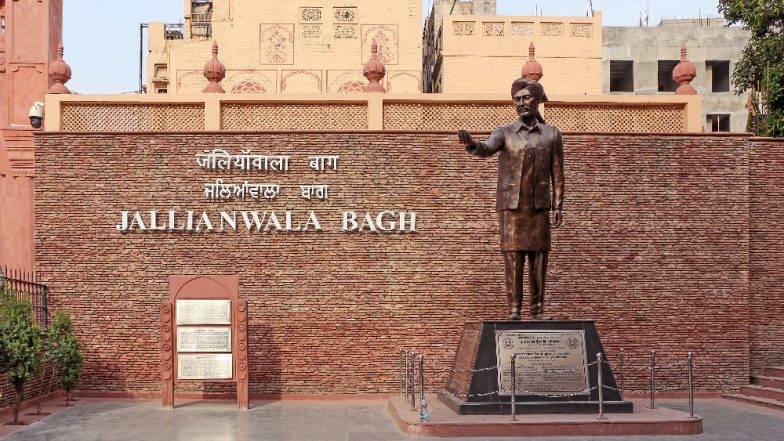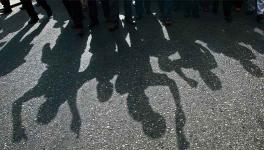Centenary of Jallianwala Bagh Massacre, No Apology Yet

Image Courtesy: Wikimedia Commons
April 13, 2019, will mark 100 years of the Jallianwala Bagh massacre, one of the most heinous crimes committed by the British government in their colonies when they ruled almost half of the globe.
While the Indian soil, where this monstrous act took place remains eluded from even customary observances at the behest of the government, the Indian community in UK is up in arms. The Indian community is demanding an apology from the British prime minister for the Jallianwala Bagh massacre.
JALLIANWALA BAGH DEBATED IN HOUSE OF COMMONS
In an interesting development, on April 10, 2019, 77 Members of the British Parliament (House of Commons), wrote a letter to Jeremy Hunt, MP, Secretary of State for Foreign and Commonwealth Affairs, London, for tendering an apology for the Jallianwala Bagh massacre. The letter stated that “we cannot turn back time or erase the past, but we can take steps to recognise what happened and to respond in a way that befits a modern relationship between two countries which today enjoy normal and positive diplomatic relations” (copy of the letter attached). The letter also mentions the visit of David Cameron, the then Prime Minister of Britain, to the site of Jallianwala Bagh in 2013. He had described the events as “deeply shameful”, but stopped short of an official apology.
There has been an unprecedented support for an apology from the British PM in the debate in Westminster Hall on April 9, 2019. It witnessed cross party support for an apology. Jeremy Corbyn, leader of the Labour party, while participating in the debate, demanded an unequivocal apology for the Jallianwala Bagh massacre from Britain and nothing less than that.
Also read: Difference Between Saffron Nationalism and Bhagat Singh’s Patriotism
The Indian community in England, comprising of scores of organisations including the Indian Workers’ Association have unleashed a campaign since the last 18 months from August 2017.
There are members of parliament, academicians, writers, film makers, etc., who are part of the campaign. Some of the parliamentarians, Chris Williamson, Virender Sharma and Tanmanjeet Singh Dhesi, members of parliament from Derby North, Ealing, and South Hall and Slough, respectively, are active in the campaign.
The major organisations of Britain, which are part of the campaign include Indian Workers’ Association, South Asian People’s Forum UK, Derby Trades Union Council, Shaheed Bhagat Singh Welfare Centre- Liecester, Derby Stands up to Racism, Mandela Centre Derby, Shaheed Udham Singh Welfare Centre Birmingham, Nationalist Socialist Workers’ Union, Marx Memorial Library, Liberation, Voice of Women-Southhall, etc.
There are two focal demands of this campaign:
-
Apology for the Jallianwala Bagh massacre from the serving prime minister of Britain, and
-
Colonial history of Britishers to be taught in the school curriculum in its real merits and not to be left to individual schools.
Though, some of the schools run by the Asian communities in Britain teach colonial history, it is insufficient, feels Jogender Bains, General Secretary of one of the groups that is spearheading the campaign.
The campaign on these two demands began with an online petition in United Kingdom which was signed by over 1,50,000 people. This was followed by leaflet distribution, public meetings, radio and television debates, and also lobbying MPs of the British parliament.
The purpose to bring all the communities together was quite successful. People owing a common heritage and legacy from Pakistan, Bangladesh and India are amongst the main organisers of the campaign.
A massive march followed by a conference will be held in London on the issue of proclamation of an apology by Theresa May on April 13, 2019, marking 100 years of the massacre. Artists, writers, women activists, lawyers, local community groups etc., will be participating in the conference.
SMUGNESS CONTINUES IN INDIA
The Indian community in England, however, is reprehensible about the stance of the Indian government. They believe that the Indian government should pass a resolution in the Indian Parliament seeking an apology from the UK prime minister.
Now is the opportune time, not just because it is rightfully desired, or because 100 years is too long a period; though, both the reasons are important. Another reason is that Britain, at present, is at the crossroad, owing to its quagmire over Brexit. The terms of Brexit are still not settled and there is another section of the people in England, who are demanding a new referendum on Brexit itself.
In such a situation, Britain is searching for allies in the geo-political environment. The two major allies, which England is looking at, are the United States and India. India has a large trade potential which is of great concern to the UK. In such a background, it is imperative for the incumbent government to create an atmosphere in the country revising the Jallianwala Bagh spirit, not just because it is an opportune time, but also because it is linked to the basic spirit of India’s nationalism- ‘resistance against imperialism and unity in diversity’. The nationalism that was professed during the freedom movement, which was not for one religion’s superiority over another, but for a composite and secular India.
Just to bring facts to the fore, after the murder of former Lieutenant Governor of Punjab Michael O’ Dyer on March 13, 1940, it took two days for the UK police to find out the name of Udham Singh, as he had proclaimed his name as “Ram Mohammad Singh” immediately after killing Dyer. Thus, signifying the spirit of India and its nationalism.
Also read: Republic Under Siege
Unfortunately, the last five years of BJP rule forgot to even observe the centenary of the Jallianwala Bagh massacre. Rather, the BJP government deliberately did not adopt such a resolution for observing programmes that could have generated a spirit of nationalism in the young minds of the country. Because revising the Jallianwala Bagh massacre would also revise the basic spirit of India and Indianness i.e., brotherhood. It is the very essence prevalent in the society that the BJP government has targeted during its rule by polarising the communities on religious and caste lines-thus bringing in an exclusionary model of nationalism.
Prime Minister Modi, happens to be the chairperson of the Jallianwala Bagh National Memorial Trust. Some of the trustees including former Chief Minister of Punjab, Prakash Singh Badal, have stated that they are not aware of the organisation of centenary events at the Jallianwala Bagh. On February 10, 2019, M B Rajesh, Communist Party of India (Marxist) MP from Kerala who had visited the site along with his family members, wrote to the PM about the sorry state of affairs of the Jallianwala Bagh site and asked the PM to ensure that the site is properly maintained. He alleged that, due to paucity of funds some of the light and sound systems were not working. This is indeed shocking, that a monument of such international relevance is being crippled because of lack of funds from the central government and that too for a trust, of which the prime minister himself is the chairperson. It is not a surprise that the Jallianwala Bagh trust has not met even once in the year 2018 to take stock of the situation. This amply shows what kind of interest the BJP government has towards such a historic site.
Whereas, the ‘foreign soil’ in Britain reverberates with the slogans of ‘justice for Jallianwala Bagh massacre’ and apology from the British prime minister; the Indian government is yet to take a firm position on it. This does not undermine the campaign unleashed by several communities and groups and political parties observing the centenary of Jallianwala Bagh massacre. The CPI(M), which passed a resolution in April 2018, in its 22nd party congress for organising a variety of events throughout the country, held a series of programmes in this regard. This was done to revisit the lessons of the struggle and to understand the people’s resolve to free India from the colonial yoke.
The 17th Lok Sabha, once it gets constituted in May 2019, must, as one of its first major initiatives pass a resolution seeking an apology from the British prime minister, thus, mounting pressure on the UK government to acknowledge the havoc they had made with their past colonial rule.
Get the latest reports & analysis with people's perspective on Protests, movements & deep analytical videos, discussions of the current affairs in your Telegram app. Subscribe to NewsClick's Telegram channel & get Real-Time updates on stories, as they get published on our website.
























